Toyota Mirai VS Tesla Model S
Toyota Mirai
The Toyota Mirai represents a groundbreaking step in hydrogen fuel cell technology, offering an eco-friendly alternative to traditional petrol engines. Its sleek design and futuristic aesthetic make it a standout on the road, while the interior combines comfort with cutting-edge features. With its impressive range and quick refuelling capabilities, the Mirai is paving the way for the future of sustainable motoring.
detailsTesla Model S
The Model S continues to set the standard for luxury electric vehicles, seamlessly blending performance with cutting-edge technology. Its sleek design and spacious interior provide an unparalleled driving experience, making it an ideal choice for modern enthusiasts. With features that emphasize both safety and sustainability, the Model S showcases the future of automotive innovation.
details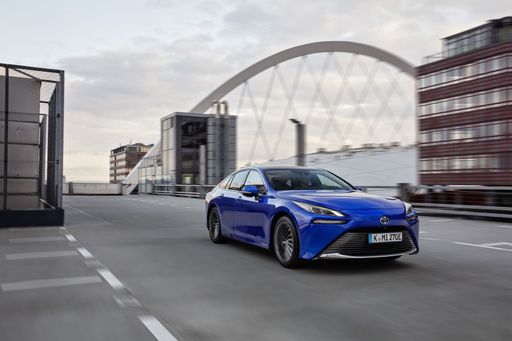 @ Toyota
@ Toyota
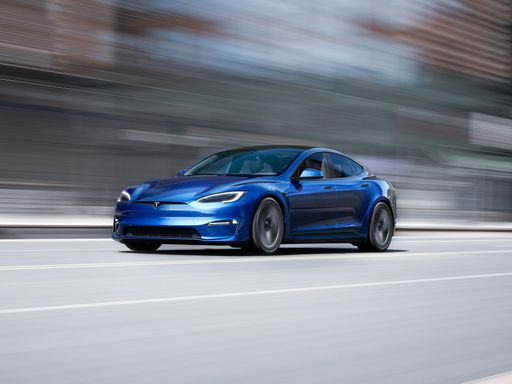 @ Tesla
@ Tesla
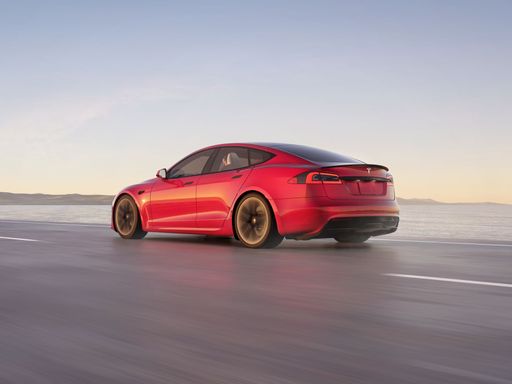 @ Tesla
@ Tesla
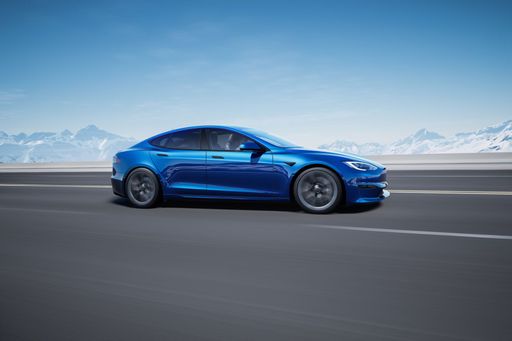 @ Tesla
@ Tesla
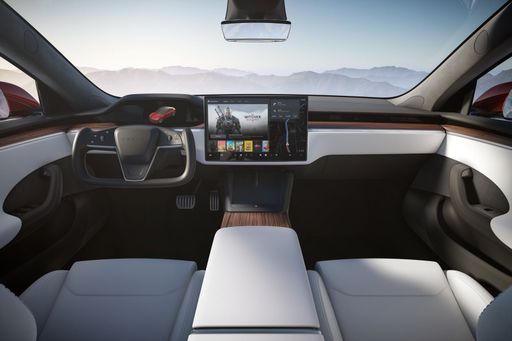 @ Tesla
@ Tesla
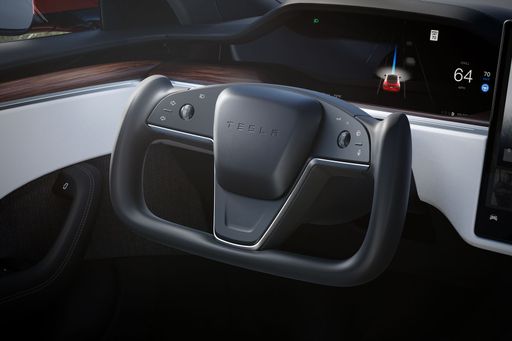 @ Tesla
@ Tesla
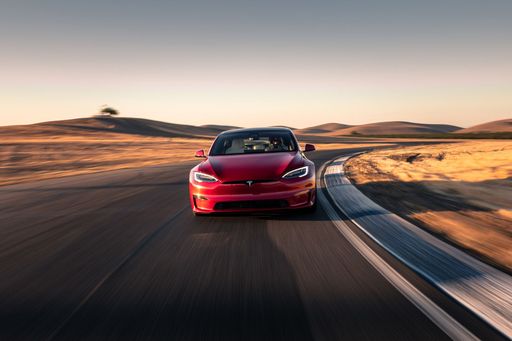 @ Tesla
@ Tesla
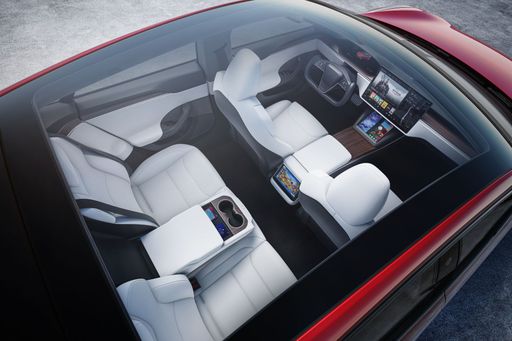 @ Tesla
@ Tesla

|

|
|
|
|
Costs and Consumption |
|
|---|---|
|
Price
-
|
Price
about 79700 - 92600
£
|
|
Consumption L/100km
-
|
Consumption L/100km
-
|
|
Consumption kWh/100km
-
|
Consumption kWh/100km
17.5 - 18.7
kWh
|
|
Electric Range
-
|
Electric Range
600 - 634
km
|
|
Battery Capacity
-
|
Battery Capacity
-
|
|
co2
-
|
co2
0
g/km
|
|
Fuel tank capacity
-
|
Fuel tank capacity
-
|
Dimensions and Body |
|
|
Body Type
-
|
Body Type
Hatchback
|
|
Seats
-
|
Seats
5
|
|
Doors
-
|
Doors
5
|
|
Curb weight
-
|
Curb weight
2170 - 2265
kg
|
|
Trunk capacity
-
|
Trunk capacity
793
L
|
|
Length
-
|
Length
5021
mm
|
|
Width
-
|
Width
1987
mm
|
|
Height
-
|
Height
1431
mm
|
|
Payload
-
|
Payload
364
kg
|
Engine and Performance |
|
|
Engine Type
-
|
Engine Type
Electric
|
|
Transmission
-
|
Transmission
Automatic
|
|
Transmission Detail
-
|
Transmission Detail
Reduction Gearbox
|
|
Drive Type
-
|
Drive Type
All-Wheel Drive
|
|
Power HP
-
|
Power HP
670 - 1020
HP
|
|
Acceleration 0-100km/h
-
|
Acceleration 0-100km/h
2.1 - 3.2
s
|
|
Max Speed
-
|
Max Speed
250 - 300
km/h
|
|
Torque
-
|
Torque
-
|
|
Number of Cylinders
-
|
Number of Cylinders
-
|
|
Power kW
-
|
Power kW
493 - 750
kW
|
|
Engine capacity
-
|
Engine capacity
-
|
|
Top speed
-
|
Top speed
250 - 300
km/h
|
General |
|
|
Model Year
-
|
Model Year
2022 - 2023
|
|
CO2 Efficiency Class
-
|
CO2 Efficiency Class
A
|
|
Brand
-
|
Brand
Tesla
|
Toyota Mirai
The Future of Driving: Introducing the Toyota Mirai
The Toyota Mirai represents a significant leap forward in automotive innovation, being one of the leading vehicles in the hydrogen fuel cell market. As we continue to search for sustainable transportation solutions, the Mirai stands out with its pioneering technology and exceptional driving features.
Revolutionary Hydrogen Fuel Cell Technology
At the heart of the Toyota Mirai is its groundbreaking hydrogen fuel cell system. Unlike conventional internal combustion engines, the Mirai uses a fuel cell stack to generate electricity through the chemical reaction between hydrogen and oxygen. This process not only powers the car with zero emissions—producing only water vapour as a byproduct—but also delivers a smooth and silent drive.
Technical Specifications and Performance
The Toyota Mirai is designed with performance in mind. It boasts a power output of 182 PS (134 kW) and delivers a robust 300 Nm of torque, allowing it to accelerate from 0 to 100 km/h in just 9.2 seconds. While its top speed is a respectable 175 km/h, it's the Mirai's impressive range that really stands out. The vehicle can travel up to 650 km on a single hydrogen fill-up, making it a practical choice for long-distance travel.
Sophisticated Design and Comfort
Designed as a saloon, the Toyota Mirai combines aesthetic appeal with comfort. Its dimensions—4975 mm in length, 1885 mm in width, and 1470 mm in height—provide a spacious interior for five passengers. The design is sleek and modern, reflecting its advanced engineering. The boot offers 300 litres of storage, suitable for everyday needs.
Advanced Features and Safety
The Toyota Mirai doesn't just excel in propulsion technology; it also includes a range of advanced features to enhance driver comfort and safety. Available in three trims—Advanced, Executive, and Luxury—the Mirai includes state-of-the-art safety systems and infotainment options to ensure a connected and secure driving experience.
Cost and Efficiency
While the price of the Toyota Mirai ranges from €65,990 to €76,290, its monthly running costs—estimated between €1,496 and €1,672—and per kilometre costs of 59.9 to 66.9 cents, reflect the efficient nature of hydrogen-powered vehicles. Considering its innovative technology, the Toyota Mirai offers excellent value for those looking to invest in the future of eco-friendly transport.
The Toyota Mirai: Driving Towards a Sustainable Future
Overall, the Toyota Mirai is more than just a car; it's a vision for the future of sustainable transportation. With its cutting-edge hydrogen fuel cell technology, impressive range, and commitment to zero-emissions driving, the Mirai sets a new standard in environmentally conscious car design. Whether you're an eco-enthusiast or just someone seeking a reliable and technological advanced vehicle, the Toyota Mirai is worth considering.
Tesla Model S
The Revolutionary Tesla Model S: The Pinnacle of Electric Vehicles
The Tesla Model S has reshaped the landscape of electric vehicles since its introduction, combining luxury, performance, and cutting-edge technology into a single package. As we delve into the technical aspects and innovations of this remarkable car, it becomes clear why it stands out in an increasingly crowded market.
Performance That Redefines Speed
The latest iterations of the Tesla Model S offer exhilarating performance, with two distinct variants: the standard Model S and the thunderous Model S Plaid. The standard Model S is powered by a robust electric motor producing 670 horsepower, allowing for a jaw-dropping 0-100 km/h time of just 3.2 seconds. For those who demand even more power, the Model S Plaid boasts a staggering 1,020 horsepower, achieving the same speed in an incredible 2.1 seconds.
Both models feature all-wheel drive and a sophisticated reduction gearbox that ensures optimal traction and efficiency, making every drive an exhilarating experience. The Model S’s top speed reaches up to 250 km/h for the standard version, while the Plaid variant impressively escalates to 300 km/h.
Range and Efficiency: Driven by Innovation
One of the most significant concerns for electric vehicle owners is range, and Tesla has addressed this head-on with the Model S. The standard Model S boasts an impressive electric range of 634 km on a single charge, demonstrating the extraordinary efficiency of Tesla’s engineering. The Plaid model, while slightly less at 600 km, still puts many competitors to shame.
The energy consumption rates for both models are equally commendable, with the standard version achieving a remarkable 17.5 kWh/100 km and the Plaid version at 18.7 kWh/100 km. This high efficiency is not only good for the environment but also for the owner's wallet, providing longer driving ranges between charges.
Innovative Technology and Features
The Tesla Model S is loaded with high-tech features designed to enhance the driving experience. The centerpiece of this technological innovation is its large touchscreen interface. This 17-inch display controls virtually every aspect of the vehicle, from navigation to climate control, creating a streamlined and modern cabin environment.
Additionally, the Model S includes advanced autopilot features that allow for semi-autonomous driving capabilities, redefining what drivers can expect from their vehicles. These innovations highlight Tesla's commitment to safety and convenience, making the Model S not just a car but an advanced tech-laden machine.
Luxury Meets Practicality
The Model S does not compromise on luxury. With a spacious interior accommodating five passengers and a premium finish, it offers comfort that rivals luxury sedans. The trunk capacity of 793 liters ensures ample space for luggage or other essentials, making it a practical choice for families or long road trips.
Moreover, its sleek hatchback design merges elegance with functionality, while the eco-conscious design features a remarkable CO2 efficiency class of A, underscoring Tesla’s commitment to sustainability.
Conclusion: The Future Is Electric
The Tesla Model S exemplifies the future of automotive technology, merging unparalleled performance, innovative features, and luxury. As electric vehicles continue to gain traction in the global market, the Model S stands as a benchmark, illustrating what is possible when cutting-edge technology meets passionate engineering. As drivers demand more from their vehicles, the Model S proves itself not just as a car, but as a movement toward a sustainable and exhilarating future.
